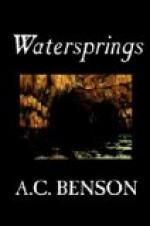“Yes,” said Howard, “I quite understand, and I am glad you have told me. You know I am a sort of doctor in these matters, and I have often heard undergraduates say the same sort of thing. They are restless, they want to go out into life, they want to work; and when they begin to work all that disquiet disappears. It’s a great mercy to have things to do, whether one likes it or not. Work is an odd thing! There is hardly a morning at Cambridge when, if someone came to me and offered me the choice of doing my ordinary work or doing nothing for a day, I shouldn’t choose to do nothing. And yet I enjoy my work, and wouldn’t give it up for anything. It is odd that it takes one so long to learn to like work, and longer still to learn that one doesn’t like idleness. And yet it is to win the power of being idle that makes most people work. Idleness seems so much grander and more dignified.”
“It is curious,” said Maud, “but I seem to have inherited papa’s taste for occupation, without his energy. I wish you would advise me what to do. Can’t one find something?”
“What does my aunt say?” said Howard.
“Oh, she smiles in that mysterious way she has,” said Maud, “and says we have to learn to take things as they come. She knows somehow how to do without things, how to wait; but I can’t do that without getting dreary.”
“Do you ever try to write?” said Howard.
“Yes,” said Maud, laughing, “I have tried to write a story—how did you guess that? I showed it to Cousin Anne, and she said it was very nice; and when I showed it to Jack, and told him what she had said, he read a little, and said that that was exactly what it was.”
“Yes,” said Howard, smiling, “I admit that it was not very encouraging! But I wish you would try something more simple. You say you know the people here and talk to them. Can’t you write down the sort of things they say. the talks you have with them, the way they look at things? I read a book once like that, called Country Conversations, and I wondered that so few people ever tried it. Why should one try to write improbable stories, even nice stories, when the thing itself is so interesting? One doesn’t understand these country people. They have an idea of life as definite as a dog or a cat, and it is not in the least like ours. Why not take a family here; describe their house and possessions, what they look like, what they do, what their history has been, and then describe some talks with them? I can’t imagine anything more interesting. Perhaps you could not publish them at present; but they wouldn’t be quite wasted, because you might show them to me, and I want to know all about the people here. You mustn’t pass over things because they seem homely and familiar—those are just the interesting things— what they eat and drink and wear, and all that. How does that strike you?”
“I like the idea very much indeed,” said Maud. “I will try—I will begin at once. And even if nothing comes of it, it will be nice to think it may be of use to you, to know about the people.”




